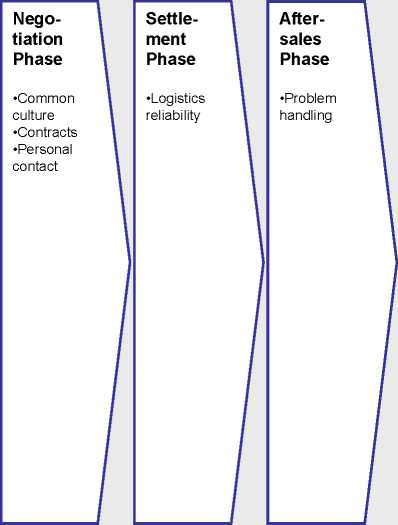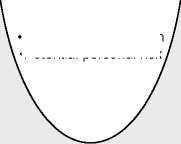10 Trust and Risk in Business Networks: Towards a Due Diligence for Electronic Commerce
tics as well as the current market situation of supply and demand. During the actual transaction
and its phases, intense information exchange, communication and interaction takes place. This
is important as frequent communication is a determinant stimulating the generation of trust. It
is important to note that for different scenarios in food networks, the relative importance of
certain trust signals or control elements changes (see Seidel, 2005). The provision of informa-
tion and support of communication and interaction between the parties needs to be matched
with options from ICT and multimedia tools.
Transaction environment: industry sector structure, rules and norms, regulation, products and characteristics, market situation

Seller
Selling company:
■Company strategy
■Company culture
■Potential gain
for company
■Potential risk
for company
■Urgency of
selling product
Selling agent:
■Sum of experience
■Knowledge
Potential personal gain
Potential personal ris

Infor-
mation
Phase
•Seller reputat.
•Info. on
transaction
settling
•Info. on prod.
processes
•Product sample
•Logist. warranty
•Product warranty
•Info. on product
•Impression of
selling agent
•Info. on company
•Recommend.
by trusted party
•T rusted
quality sign
•Reputation
technology
provider
•Payment
technology
•Usability
•Technical
infrastructure

Purchasing company:
•Potential gain
for company
•Potential risk
for company
•Company strategy
•Company culture
•Urgency of supply needs

Buyer
Buying agent:
•Sum of experience
•Knowledge
•Potential personal gain
•Potential personal risk

Figure 5. Determinants for transaction decisions and trust and control elements in the transaction pro-
cess phases and its environment
5 Empirical results and future research
First empirical results regarding the validity of the e-commerce due diligence were received in
experiments analyzing the suitability of multimedia elements for generating transaction trust in
electronic transaction environments as well as the effect from multimedia trust elements on
transaction efficiency. The suitability of multimedia transaction elements for trust generation
was tested in an experimental long term study for an agrifood transaction scenario where expe-
rience from past transactions is important. Different degrees of relationships between partici-
pants were realized in the electronic transaction environment to test whether multimedia trust
elements raised the transaction confidence level sufficiently to make individuals engage in
electronically supported transactions: anonymous, reputation, videoconference and personally
known. Results show the suitability of reputation and videoconference as trust generating ele-
ments. The experimental comparison between different levels of communication support (text,
audio, multimedia) in an agrifood transaction scenario and therefore trust generation showed
that transactions with multimedia support were most efficient (Hausen et al., 2006).
More intriguing information
1. Happiness in Eastern Europe2. Climate change, mitigation and adaptation: the case of the Murray–Darling Basin in Australia
3. Uncertain Productivity Growth and the Choice between FDI and Export
4. Fiscal Insurance and Debt Management in OECD Economies
5. CGE modelling of the resources boom in Indonesia and Australia using TERM
6. Confusion and Reinforcement Learning in Experimental Public Goods Games
7. Who is missing from higher education?
8. Les freins culturels à l'adoption des IFRS en Europe : une analyse du cas français
9. Categorial Grammar and Discourse
10. Innovation and business performance - a provisional multi-regional analysis